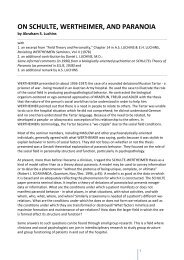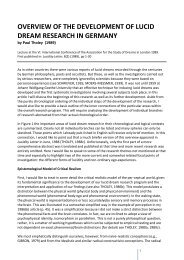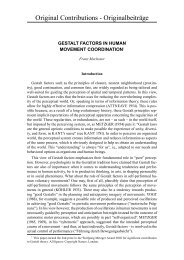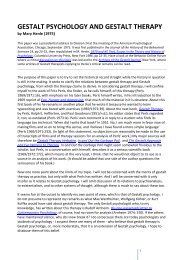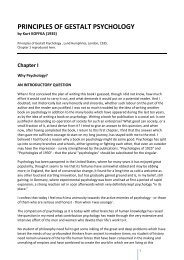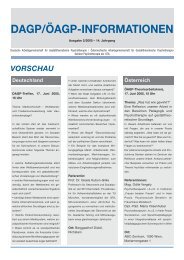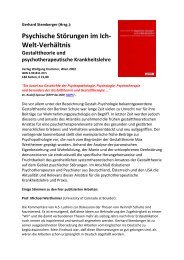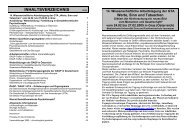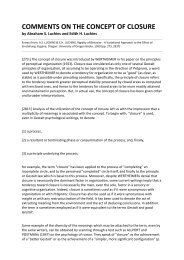pdf-Download - Society for Gestalt Theory and its Applications (GTA)
pdf-Download - Society for Gestalt Theory and its Applications (GTA)
pdf-Download - Society for Gestalt Theory and its Applications (GTA)
Create successful ePaper yourself
Turn your PDF publications into a flip-book with our unique Google optimized e-Paper software.
Altogether, it appears that a psychology without the principle of genetic identity is not only<br />
possible, but - in the face of the existing facts - necessary.<br />
4. On the Principle of Genetic Minimum Outfit<br />
In the discussion of this principle it is necessary to take into account the fact that the principle of<br />
objectivity was already rejected by behaviourism <strong>its</strong>elf (see above). The most significant<br />
arguments against the minimum outfit principle are derived from the subjective sphere.<br />
In contrast to the tabula rasa approach, all sensual data enter<br />
a) an already existing <strong>and</strong> unchangeable system of dimensions - not more <strong>and</strong> not less than three<br />
space- <strong>and</strong> one time-dimension. Moreover, sensual data are limited to a system of elementary<br />
qualities already existing. Interestingly, this system may differ between individuals in a clearly<br />
definable way according to their basic outfit (DALTONism).<br />
b) the bulk of the sensual data is divided <strong>and</strong> grouped spontaneously in accordance with a given<br />
system of categories.<br />
c) this grouping is distributed all over the three given space dimensions according to the minimum<br />
<strong>and</strong>/or optimum principles (Prägnanz-tendencies) which are inherent to the system <strong>and</strong> not<br />
modifiable by individual experience, thus only partially accord- ing to experience, but partially<br />
defying experience. (See among others, E. MACH, W. METZGER, G. KANIZSA).<br />
The facts a), b) <strong>and</strong> c) are not consequences of experiences, but rather conditions which make it<br />
possible to acquire any experience; they are "pre-empirical".<br />
The principle of reaction patterns inherent to the system is not to be confused with the principle<br />
of nativism. Nativism maintains only - in contrast to empiricism - that adjustment to reality is in<br />
certain aspects reached phylogenetically rather than ontogenetically. It does not mention systemspecific<br />
reaction patterns at all. Moreover, there are in the case of animals, many <strong>and</strong>, in the case<br />
of men, at least several strucures originating from the above laws, without any previous<br />
experience resp. success <strong>and</strong> error learning with biologically specific releasing functions. These<br />
cannot be under- stood without admitting some analogon of the much abused "idea innata". (The<br />
English expression IRM - innate releasing mechanism, as well as the German AAM - angeborener<br />
ausloesender Mechanismus, adequately reflect these facts only in their first two words, but the<br />
word "mechanism" is misleading <strong>and</strong> should be replaced by the word "cue", in German<br />
"Merkmal").<br />
All this means that the principle of genetic minimum outfit is not consistent with the facts. Thus, a<br />
psychology without this principle is not only possible but rather necessary.<br />
5. On the Principles of Elementarism <strong>and</strong> Connectionism<br />
Under the assumption that the principle of objectivity is rejected, it becomes necessary to discuss<br />
the above two principles with a view to the three following problems:<br />
1) The problem of autonomous motions (motorics)<br />
2) The problem of the surrounding world (situations)<br />
7



